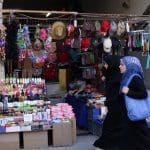
Executive Summary
The Palestinian Authority (PA) remains unable to meet the needs of its public sector employees. Indeed, the issue of salaries in Palestine has received considerable media attention recently. This policy brief highlights the PA’s politicization of employment and salaries in the Palestinian public sector, and how both are exploited as a political tradeoff rather than a natural right of employees. Furthermore, the brief argues that the drastic gap in salary distribution among public sector employees represents a critical source of inequality in Palestinian society.
Notwithstanding the Israeli regime’s strategies for manipulating the PA’s sources of funding, such as clearance revenues and financial leakage, as well as the economic impacts of the COVID-19 pandemic, the brief focuses on identifying the PA’s internal mechanisms for distributing financial resources in the form of jobs and salaries as a way to serve the dominant elite’s agenda. The brief ends with recommendations for how to remedy this situation and bring about substantive economic equality.
The PA was founded in 1994 with an enlarged public sector on both the civil and security levels. That is, in 1994, the number of employees in the public sector amounted to 39,000, and by 2003, that number rose to 124,000. Appointments in the PA were premised on factional loyalty and nepotism, which resulted in the employment of many unqualified persons in high-ranking positions. Indeed, the PA chairman has been empowered to appoint undersecretaries, directors, governors, and heads of public agencies and non-ministerial institutions, the majority of whom are Fatah members.
The inability of the PA to meet the most basic of its economic obligations to the Palestinian people has led it to beg for aid from international donor agencies, and consequently, to comply with their increasingly restrictive conditions. This has included the imposition of security coordination ties between the PA, Israel, and the United States, which has further delayed the payment of public sector salaries.
The situation worsened after the political division in Palestinian leadership following Hamas’s victory in the 2006 elections. In response, Israel refrained from transferring clearance revenues to Palestinians, while international aid and grants to the Palestinian government ceased almost completely. Then, in 2008, former Prime Minister Salam Fayyad implemented neoliberal policies which imposed an austerity-oriented approach to recruitment in the public sector. However, the plan failed to change the inflated reality of employment in the PA’s bureaucracy, or the appointment patterns which continued to hinge on political loyalties, clientelism, and favoritism.
In 2017, the PA imposed a series of sanctions on the de facto government in Gaza. The sanctions appeared in several forms, the most prominent of which was withholding public sector salaries, which has had a significant impact on all sectors of Gaza’s economy. Other penalties, including referring a number of employees to early retirement, continued to apply. The sanctions continued throughout the first half of 2018 as 32,000 employees in Gaza only received 50-70% of their salaries.
Moreover, the Palestinian public sector suffers from economic disparity and inequality. More than half of public sector employees earn 2,200 shekels ($664) or less, whereas some directors of public institutions receive more than $10,000 per month. The gap is even wider, by around 15%, in favor of security personnel over their civilian counterparts in the public sector.
The PA seeks to mitigate its economic pressures and diminishing foreign aid by passing the burden down to the people. It does this by reducing welfare allocations to limited-income Palestinians, discontinuing payments to Gaza-based civil servants, and increasing taxes on farmers and small merchants. Meanwhile, it fails to devise strategic plans to cut the salaries of senior employees and redistribute the resulting funds more equitably.
The PA’s politicization of public sector employment and salaries represents a clear abuse of power. To remedy this situation, the following measures must be taken:
- The government should rebuild representative structures and abolish the policy of one-party rule.
- The independence of the judiciary must be strengthened, including in appointing judges according to merit and professionalism.
- The government must approve job description cards.
- The government should commit to abide by standards that guarantee the right of Palestinians to work in the public sector.
- The government must establish criteria for determining the salaries and bonuses of heads of public institutions.
- Independent trade unions must be revived to represent workers and employees in a democratic and transparent fashion far from the influences of political elites and security threats.
- Civil society institutions must support unionist movements. These grassroots movements must be part of a serious and radical review of the structure of power, taking into account the broader role of re-building the national movement and its representative institutions.
Overview
Public sector employment and salaries in the West Bank and Gaza reflect a state of constant concern and anxiety for Palestinians. This is due to the Palestinian Authority’s (PA) precarious existence since its inception in 1994, the political fluctuations in its relationship with the Israeli occupation and donor countries, and internal political conflicts. It is also due to the PA’s politicization and exploitation of public offices to advance personal interests and ensure loyalties and cronyism. 1
The concern over salaries has become a prominent issue among Palestinians, creating yet another unique reality in their daily lives whereby they are constantly questioning when, if at all, they will receive their salaries. Local media outlets announce monthly breaking news about the date and percentage of salaries to be disbursed. In addition, there is extensive discussion on social media about salaries, especially on pages dedicated to publishing news of PA salaries.
This policy brief highlights the PA’s politicization of employment and salaries in the Palestinian public sector, and how both are exploited as a political tradeoff rather than a natural right of employees. The brief argues that the drastic gap in salary distribution represents a significant source of economic inequality in Palestinian society.
Although it recognizes different Israeli strategies for manipulating the PA’s sources of funding, such as clearance revenues and financial leakage, as well as the economic impacts of the COVID-19 pandemic which have dealt significant blows to the PA’s ability to meet the economic needs of the Palestinian people, the brief focuses on identifying the PA’s internal mechanisms for distributing financial resources in the form of jobs and salaries as a way to serve the dominant elite’s agenda. These mechanisms are carried out with an eye to reinforcing the PA’s power, thereby suppressing political opponents and those who call for reform. The brief concludes with recommendations for remedying the system.
Public Sector Employment, Salaries, and Clientele Networks
The PA was founded in 1994 with an enlarged public sector of ministries, agencies, and bureaucracies in the civilian and security sectors. The main goal of this inflated sector was to absorb the largest number of loyalists and partisans possible in order to ensure the PA’s stability during its founding years.
At first, the PA hired 39,000 public sector employees (25,000 civilian personnel and 14,000 security personnel) at random and based on favoritism, as well as on partisan and political considerations. As a result, many unqualified people were appointed to senior positions, sometimes without there being a vacancy.
This trend continued throughout the 1990s as the PA’s institutions became seriously inflated due to increased hiring. In 1997, only three years after the PA was created, the number of public sector employees hit 86,000, with a sustaining cost of about $500 million, or 55% of the PA’s running expenses, mostly from donor spending and clearance funds. Clearance funds are the total Palestinian taxes that the Israeli occupation collects and transfers it to the PA in exchange for a 3% deduction as an administrative commission.
During the 2nd Intifada and the ensuing financial hardship caused by donor restrictions and Israel’s unstable transfer of clearance funds, the chaotic appointments continued unchecked, with the number of public sector employees reaching 124,000 (71,000 civilian and 53,000 security personnel) in 2003, and a payroll in excess of $665 million.
These appointments were primarily based on political loyalties and affiliations, especially with regard to senior positions. In other words, the PA chairman is empowered to appoint undersecretaries, directors, governors, and heads of public agencies and non-ministerial institutions, the majority of whom are Fatah members.
The PA chairman is empowered to appoint undersecretaries, directors, governors, and heads of public agencies and non-ministerial institutions, the majority of whom are Fatah members Share on XThe financial risks and the PA’s decreasing ability to meet its payroll commitment – which could further jeopardize its already withered existence due to the ongoing Israeli occupation – have driven the PA to beg for more donor funding, and consequently, to comply more with their ever-tightening criteria and conditions. These include direct political interference in PA decisions. For example, the World Bank has recommended, in conjunction with many western donors, to intensify neoliberal policies, as well as to systematically restructure PA institutions and the security apparatus to impose political stability by creating ties with Israeli and American security interests.
In response, the council of ministers was formed in 2003, a 100-day reform plan was drafted, and a unified account was created. The government took several decisions to control the hiring process, regulate the relationship with the public service commission, and institutionalize appointments and promotions. Despite these measures to curb recruitment rates, the number of public sector employees rose in 2005 to 150,000, including 79,000 civilian and 71,000 security personnel.
Following the division in Palestinian leadership and the formation of a caretaker government, Prime Minister Salam Fayyad issued a decision to suspend all appointments made after December 31, 2005, along with the salaries associated with them. This brought the number of public sector employees down from 180,000 to 150,000 by mid-2007. Fayyad then launched the Palestinian Reform and Development Plan of 2008-2010, which included plans for fiscal reform and management of public funds, as well as a package of neoliberal policies that took an austerity-oriented approach to recruitment in the public sector.
However, the plan failed to change the inflated reality of employment in the PA’s bureaucracy, or the appointment patterns which continued to hinge on political loyalties, clientelism, favoritism and personal connections. In 2009, for example, there were 169,000 public sector employees (91,000 civilian and 77,000 security personnel) receiving $1.4 billion in salaries from the PA, of whom more than 17,000 received salary without reporting to work. When the term of Fayyad’s government was over, public sector employees numbered 180,000, approximately 22% of the workforce, at a cost of $2 billion.
Despite their claims of implementing wide-scale reforms and building institutions on professional foundations, subsequent governments continued to politicize public service and determine salary earners based on personal interests. This practice has drastically expanded clientele networks, which are largely determined by internal conflicts between authority figures and increasing security apparatus interference in civilian institutions. This dynamic is part of the competition between rivals within the PA looking to widen their constituencies and increase their power.
For example, a 2018 report by AMAN revealed that the forced early retirements in 2017 of 22,000 public sector employees were not about downsizing and reducing the salary burden as claimed, but were rather used by some officials to settle partisan or personal scores. Indeed, the report revealed that some were forcibly transferred to early retirement, although they received sound evaluations. Furthermore, this had the counter effect of promoting nepotism as some public servants actively sought to be excluded from retirement with the help of influential personalities.
This type of politicization has also included reducing the number of employees by settling partisan disputes and referring employees to retirement according to their political affiliations. For example, many were referred to early retirement forcibly without there being any clear criteria regarding the early retirement process, or they were transferred from their work areas to remote areas as a punitive measure for their participation in unionist activities and for their political affiliations.
Employment and Salaries in Light of the Palestinian Political Divide
The politicization of public sector employment and salaries is central to empowering the PA’s clientele network. Indeed, by exploiting public service and salaries, the PA in Ramallah serves the special interests of competing elites, and it does so strategically as a tool in its conflict with the Hamas government in Gaza.
Hamas’s win in the Legislative Council elections, and its subsequent formation of a government in 2006, went against both Israeli interests and donor agendas. In response, Israel refrained from transferring clearance revenues to Palestinians, which amounted to 4.8 billion shekels ($1.5 billion) in 2006-2007, while international aid and grants to the Palestinian government ceased almost completely. As a result, salaries were not paid for months, affecting approximately 942,000 Palestinians (25% of the population) entirely dependent on PA salaries. In 2007, the poverty rate in the West Bank and Gaza increased to 60%, the highest level recorded in a decade.
Following Hamas’s victory, the PA asked around 70,000 public sector employees in Gaza not to report to work, and continued to pay their salaries Share on XThe desire to control the recruitment process and determine salary earners had an important, albeit underdiscussed role in the conflict between Hamas and Fatah in the aftermath of 2006 and the split between Ramallah and Gaza. While the Hamas government was denied international financial aid, the US administration continued to transfer funds to PA President Mahmoud Abbas to pay the salaries of loyal security forces, especially the presidential guard, in order to curb Hamas’s penetration into the PA’s security sector.
Following the political split, both authorities in Ramallah and Gaza sought to dominate public sector employment, excluding those who did not meet the criteria of the ruling party. For example, after forming a caretaker government, the PA enforced a “security clearance” requirement by which those who were not “safe in terms of security,” as defined by the PA, were excluded. This policy was aimed at excluding anyone with connections to Hamas.
As a result, a number of staff at the Ministry of Education were dismissed in 2008-2009, though some were reinstated after challenging the dismissal decision issued by the minister of education. The Supreme Court ruled that the staff’s appointment became permanent as soon as their period of probation ended, and that security clearance was not a condition for appointment in the public service as per relevant laws.
Following Hamas’s victory, the PA also asked around 70,000 public sector employees in Gaza not to report to work, and continued to pay their salaries. Some 60% refrained from reporting to work while 40% declined to abide by the decision, which was one manifestation of the division between the two governments aimed at disrupting the operations of government departments in Gaza. In response, Hamas hired 28,000 employees but could not maintain full regular pay of their salaries, prompting strikes and sit-ins in protest.
In 2014, a reconciliation agreement was signed between the West Bank and Gaza governments, and a national consensus government was in the making. This included mechanisms to deal with public sector personnel in Gaza, and to ensure the return of abstaining employees to work. However, as the agreement failed, the PA continued to pay the salaries of abstaining staff and to use security clearance both as a condition for employment in the public sector, and to determine the eligibility of those already employed to receive benefits such as promotions and bonuses.
In 2017, the West Bank government imposed a series of sanctions on the de facto government in Gaza as a result of political altercations between the parties. The sanctions appeared in several forms, the most prominent of which was withholding public sector salaries, which has had a significant impact on all sectors of the economy. In March 2017, for example, cuts were made to the salaries of civil servants and servicemen who were forced to abstain from reporting to work in 2006 following Hamas’s military takeover.
Other penalties, including referring a number of employees to early retirement, continued to apply. And according to Mohammad Al-Hazaymeh, the director of the General Budget at the Ministry of Finance in Ramallah, the sanctions continued through the first half of 2018 as 32,000 employees in Gaza (19,000 service people and 13,000 civil servants) only received 50-70% of their salaries. 2
The report of the Independent Commission for Human Rights indicates that in the year 2019, the commission received 17 complaints in the West Bank and Gaza related to unfair dismissal from the civil service, without adhering to the legal standards for arresting or dismissing a public employee. The report also indicated that the volume of complaints does not necessarily reflect the extent of the violations. This is due to the continuing failure of those responsible to respond to employee complaints in Gaza.
The Salary Gap and Economic Inequality
Public sector salaries account for grave economic disparity and inequality in Palestinian society, as wide gaps exist in staff salaries within the same institution or between staff of the same grade in different institutions. More than half of public sector employees earn 2,200 shekels ($664) or less, whereas some directors of public institutions receive more than $10,000 per month.
The gap is even wider, by around 15%, in favor of security personnel over their civilian counterparts in the public sector. This disparity in public sector salaries and economic inequality could create a nurturing environment for corruption, which is evident in undeserved promotions, appointments to senior positions through cronyism, and monopolizing senior positions by elites and their loyalists.
More than half of public sector employees earn 2,200 shekels ($664) or less, whereas some directors of public institutions receive more than $10,000 per month Share on XThe PA seeks to mitigate its economic pressures, especially financial leakage (estimated in 2017 at $542 million) and diminishing foreign aid, by passing the burden down to the people. They carry this out by reducing welfare allocations to limited-income Palestinians, discontinuing payments to Gaza-based civil servants, and increasing taxes on farmers and small merchants. Meanwhile, the PA fails to devise strategic plans to cut the salaries of senior employees and redistribute the resulting funds more equitably.
In the beginning of 2016, teachers declared a strike to protest unjust distribution of PA salaries and to revive the unionist struggle for rights. They called for higher pay for teachers as they constitute a vital segment in Palestinian society, and for improved living conditions. The PA sought to thwart this movement, disbanding assemblies and demonstrations, arresting dozens of protestors, and most recently, referring 117 teachers to early retirement in 2018.
Additionally, Palestinians were recently angered by a presidential decree that referred six judges of attested competence and impartiality to early retirement. The decision was likely based on political grounds, as those judges issued “very daring decisions against the executive authority,” according to the Palestinian Judges Association. Concurrently, a retired judge in his 80s was appointed head of the Supreme Court.
Palestinians viewed the referral of certain judges to early retirement and the unlawful appointment of president-loyalist judges as an infringement of the judiciary, and part of the war that the executive authority is waging against impartiality in the PA’s judicial authority. Meanwhile, the PA claims to not submit to Israel’s demands to cease payment of prisoners’ entitlements. Yet it continues to target certain freed prisoners by cutting off their entitlements under security pretexts.
Arguably the most prominent example of Palestinians’ anger with the PA’s corruption is the recent lawsuits 165 Palestinian employees filed before the Supreme Court following the PA’s decision to cut their salaries. The employees also threatened the PA with resorting to the European Union and international institutions.
The Supreme Court ruled that it was not permissible to cut their salaries since it was clear the decision came amidst the political fallout between the PA and Mohammad Dahlan, exiled Fatah official and political rival of Mahmoud Abbas. The rule was also based on the dismissals and resignations of the Head of the Anti-Corruption Commission and the Head of the Monetary Authority without the expiry of their terms of office. The court ruled that, in the absence of transparency and accountability, this was due to political differences which do not warrant cutting staff salaries.
What Must be Done
The PA’s practices with regard to public sector employment and salaries represent a clear case of abuse of power aimed at controlling and managing institutions at the whims of a powerful clique, and according to their interests. The general state shows corruption, deepening inequalities, and increasing social and political exclusion.
Furthermore, and after nearly thirty years of the Oslo Accords, it is becoming clear that it is difficult to convince decision-makers in the PA of the necessity of making broad structural changes that take into account the principles of justice in distribution and professionalism in employment to achieve general societal interest. Therefore, large-scale, cross-sectoral societal and union movements are inevitable as a tool of pressure guaranteed by the law.
In this regard, the following measures must be taken into consideration:
- The government should rebuild representative structures and abolish the policy of one-party rule. This would encourage broader participation in decision-making, as well as monitoring and accountability.
- The independence of the judiciary must be strengthened, including in appointing judges according to merit and professionalism.
- The government must approve job description cards, specifically for senior employees, in order to monitor compliance and professionalism.
- The government should commit to abide by standards that guarantee the right of Palestinians to work in the public sector, regardless of their political orientations or affiliations.
- The government must establish criteria for determining the salaries and bonuses of heads of public institutions.
- Independent trade unions must be revived to represent workers and employees in a democratic and transparent fashion far from the influences of political elites and security threats.
- Civil society institutions must support unionist movements, lobby for justice in salaries, and launch campaigns against exclusionary policies, forced retirements, and politicization of public office. These grassroots movements must be part of a serious and radical review of the structure of power, taking into account the broader role of re-building the national movement and its representative institutions.
- To read this piece in French, please click here. Al-Shabaka is grateful for the efforts by human rights advocates to translate its pieces, but is not responsible for any change in meaning.
- Information was collected during an interview by the authors with the director of the General Budget at the Ministry of Finance, Ramallah, August 2019.














